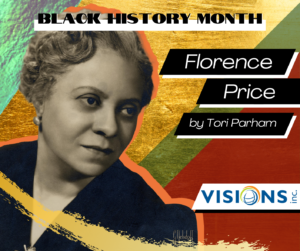Florence Price and the Truth About Black Excellence

Florence Price and the Truth About Black Excellence by Tori Parham
Each Black History Month, as we look to celebrate the accomplishments of our ancestors, it’s important not to fall into the trap of simply celebrating examples of “Black Excellence.” Black Excellence is ordinary. What is extraordinary are the circumstances which keep Black people from being recognized for their achievements. This includes enslavement, segregation, gatekeeping, violence, and erasure. In spite of all of this, Black people have made history and shaped our world. The path toward equity looks like pulling many of those voices forward into a time when they can be heard loud and clear.
With this in mind, I want to talk about one lesser-known Black historical figure who shaped my world: classical music composer Florence Price. Florence Price is the first Black woman to have a composition played by a major orchestra. I found the music of Florence Price because, as a BIPOC student studying music and composition, I hit the inevitable wall in a white-dominated field. I felt out of my element, that I was expected to know things that I couldn’t possibly know without the cultural context of formal music training; and simultaneously that my musical sensibilities were shunned for having learned things “out of order.” My teachers, who were white men, only ever showed me the compositions of other white men and, in doing so, implicitly endorsed the white supremacy in classical music.
In my frustration, I took it upon myself to find composers outside of that demographic. That is when I received the gift of the music of Florence Price.
Florence Price was born into an integrated community in Little Rock, Arkansas, April 9, 1887, and began learning piano from her mother before the age of four. She attended the New England Conservatory of Music at sixteen in 1903 and graduated in three years. As racial tensions, Jim Crow, and lynchings escalated in Little Rock, Price moved with her husband and two daughters to Chicago, Illinois in 1927. In Chicago, Price became acquainted with the Chicago Music Association, which found venues for classically-trained Black musicians. As a composer, Price was associated with the Chicago Black Renaissance with other musicians like Theodore Charles Stone, Nora Holt, Margaret Bonds, and many more.
Price’s music was influenced by the history of Black Americans who had still been enslaved not long before her birth. For example, her solo piano suite, In the Land O’Cotton, references the cotton gin and the Juba dance which originated in Africa and was brought to America by enslaved peoples. Frederick Stock, conductor of the Chicago Symphony Orchestra, took notice of Price’s work for her first orchestral composition, Symphony No. 1 in E Minor. The Chicago Symphony Orchestra performed Symphony No. 1 in June of 1933.
Although Price was rightfully honored with this performance, she struggled for the rest of her life to receive the support and recognition that she deserved in the world of classical music. It wasn’t until her scores were discovered in an Illinois attic in 2009 that these works have been able to be celebrated widely in the realm of classical music.
Listening to the music of Florence Price, it seems clear to me that lauded white composers like George Gershwin tried to replicate the sounds of composers from movements like the Chicago Black Renaissance. Interestingly, if you read Gershwin’s Wikipedia page, there is no mention of the Black composers who inspired his jazz-influenced compositions. Listening to Price’s piano composition, “Fantasie Negre,” played here by Dr. Samantha Ege as well as her Violin Concerto No. 2, peformed here by the Urban Playground Chamber Orchestra, the parallel is unmistakable.
Today, many musicians immortalize Price’s incredibly moving works through their performances. I implore you to spend this afternoon or this evening listening to the music of Florence Price and hear what I have heard: a brilliant sunrise over the agrarian fields of North America, the wind in willow over a still pond; the story of my Ancestors who breathed their culture, strength, and pride into American life.
It’s not some great accident or oversight if you’ve never heard of Florence Price. This is intentional, because Price, like so many composers who were not white men, was kept from you. We cannot celebrate Black History Month without acknowledging the intentional erasure of Black History. Black History Month must serve as a reminder that Black history is fundamental to every facet of American history despite the revisionist mythos of this nation.
By Tori Parham, VISIONS Intern
